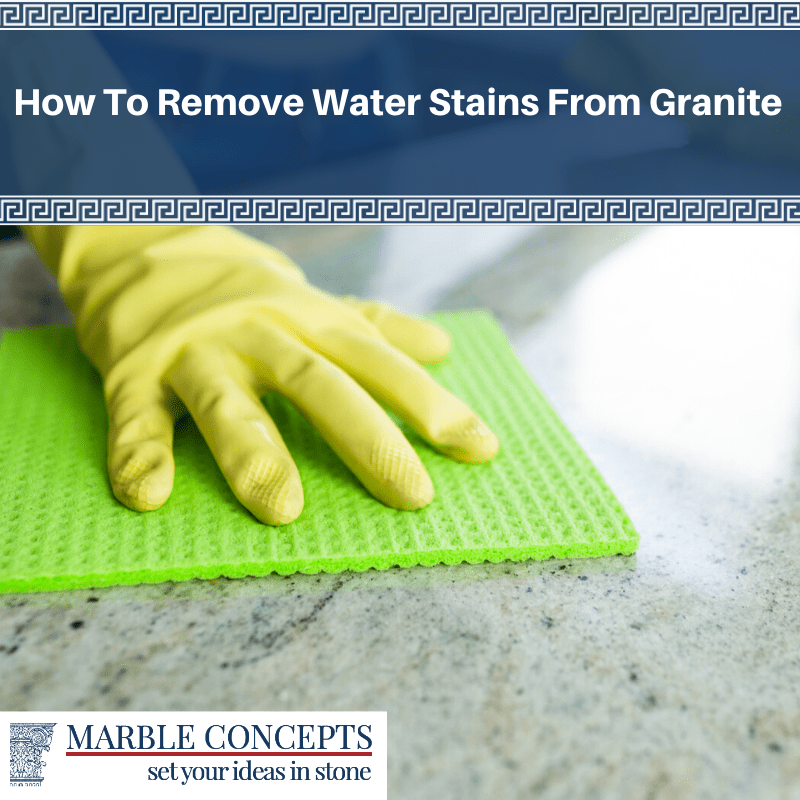Granite surfaces represent a major investment in the beauty of your home. As such, it is very important that you protect these surfaces in order to protect your investment. Chances are, you already know that acidic liquids like tea and orange juice can be absolute murder on your granite. However, it might surprise you to know that ordinary water can still stain granite and ruin its exquisite beauty.
Why Does Water Stain Granite?
Granite is a porous material. Regardless of what kind of granite you might choose, it will always have a tendency to absorb liquids. It should be noted that granite is still very dense in spite of its porous nature. This helps to keep liquid from seeping deep into the stone. However, it doesn’t take a whole lot of penetration for water to leave a stain.
Have you ever boiled water in a pot or pan? If so, you can look at the white residue on the side of the pot and see why water stains granite. The water soaks into the stone, but it can’t go very far. Thus, it will eventually evaporate. Unfortunately, it will leave behind any impurities that may have been present in the water.
Hard water is a major problem here. If you aren’t familiar with this term, it refers to water that contains a lot of minerals. In many areas, it is perfectly natural and no cause for alarm. Other than distilled water, all water will contain a certain amount of minerals, which will form a chalky white residue after it is gone.
How To Remove Water Stains From Granite
Since you chose to open up this article, there is a good chance that you are already dealing with some granite stains. If so, this section is for you. There is no need to freak out if your granite surface develops a couple of stains, but the problem does need to be addressed immediately. The longer you wait, the more the stain will harden as it penetrates deeply into the rock. Also, the water can cause serious damage to the stone if there is enough of a temperature change to make it expand.
If you catch the stain right away, there is a good chance that you can remove it with a little bit of rubbing alcohol. Make sure that you never use acidic cleaners like vinegar, lemon juice, toilet bowl cleaner, etc. While acidic cleaners will indeed remove hard water deposits from the stone, they will replace those hard water stains with acid etching stains, which are much harder to remove.
If an alcohol wipe does not do the job, you will need to make a poultice (also sometimes called an extractor). This is a substance that can pull the stain out of the stone. There are several DIY recipes for stone poultices, but we prefer a mixture of flour and hydrogen peroxide.
Start by putting the flour in a bowl that will not be used for cooking. Add a tiny bit of peroxide and mix. When all the liquid has been absorbed, add a little more and stir again. Keep doing this until you have a paste that is about the same consistency as peanut butter. From here, you just have to smear that paste on the stained spot and leave it for 48 hours. A lot of people choose to put a piece of plastic over the paste so that it can be taped in place. The poultice is a tried and true solution and has been proven to be effective in scientific studies.
How To Prevent Water Stains
You might feel that this is too much trouble, and you might even be regretting your decision to purchase granite countertops. However, there is a way that you can make this issue a lot easier. Stone sealing products are widely available and do a great job of protecting your granite from water damage.
All porous stone should be sealed, as it will always have a tendency to absorb moisture. After you have removed any existing stains, we strongly recommend that you apply a good sealer so that the problem doesn’t come back. By eliminating the porous nature of the stone, you ensure that water can never stain it again. If possible, you should go with an elastomeric sealer. These are preferred because they have a certain amount of flexibility. This allows them to flex, improving their ability to absorb impact without breaking.
Conclusion
Granite can last for centuries, but only if it is maintained properly. Whether you choose to use a sealer or just stick with the alcohol and poultice methods, your stone will stay beautiful for a lot longer because you took the extra time and effort to protect it from the elements. As a final note, we should mention that granite really does do better when it’s been sealed. Although such products are not often cheap, they are a lot cheaper than the prospect of replacing an entire countertop. If our work has been helpful to you, we ask that you fill out the contact form below so that we can bring you more of the same.






